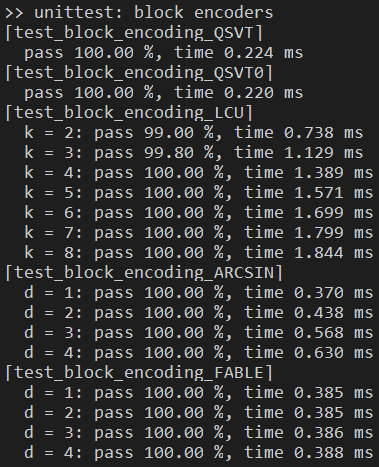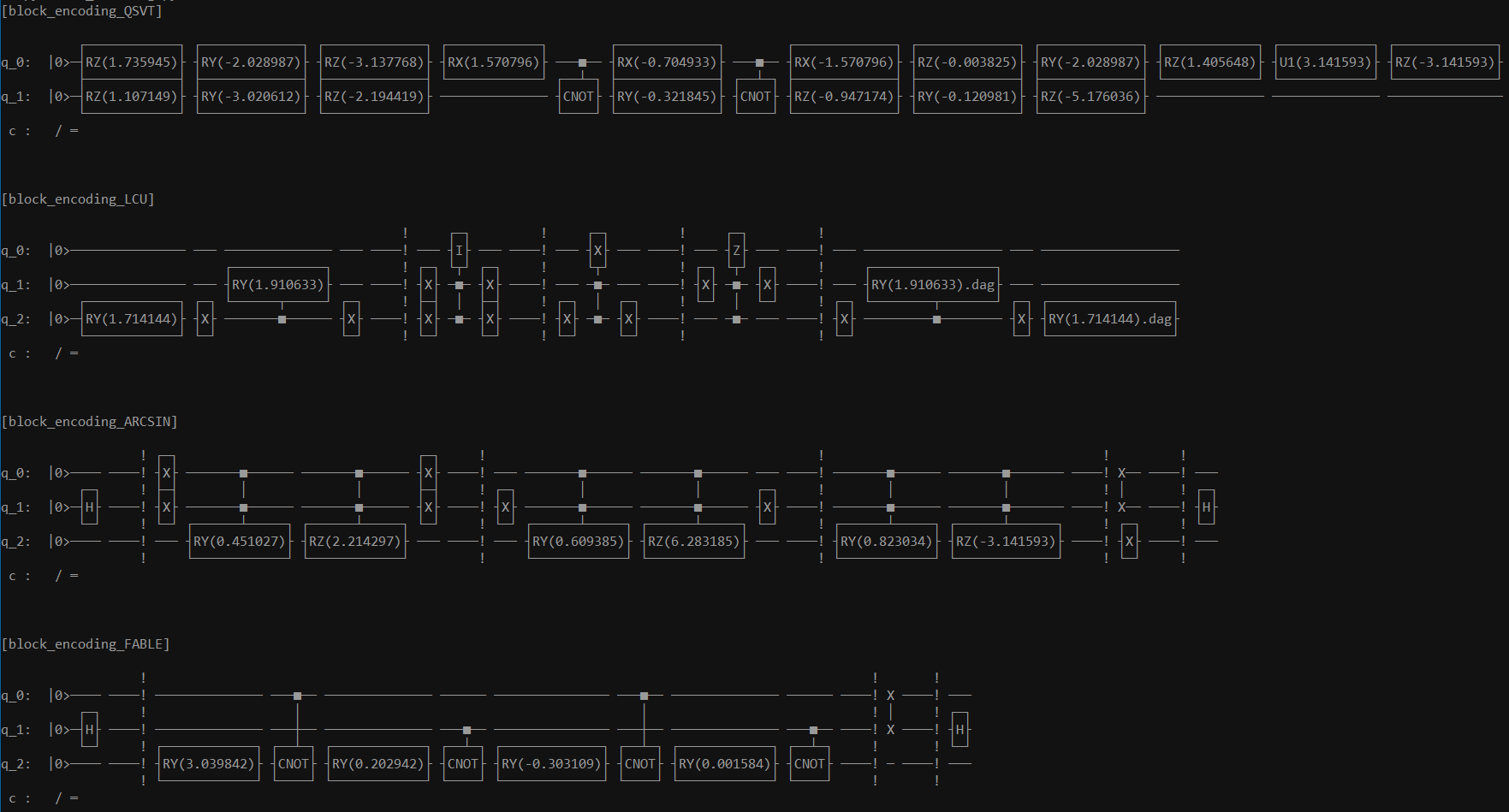Block Encodings & Quantum Discrete Adiabatic Linear-systems Solver implemented in QPanda (C++)
第三届CCF“司南杯”量子计算编程挑战赛-通用赛道 决赛
比赛页面: 第三届CCF“司南杯”量子计算编程挑战赛通用赛道
队名: 我吃两个
得分: 85.67 (复赛) / 81.67 (答辩)
获奖: 三等奖 (wtf???
👉 初赛的 repo 在这里:CCF-3rd-Pilot-Cup-first-stage
git clone https://github.com/Kahsolt/QLSDA-QPanda- add
--recursiveif you want QPanda as well
- add
- install the C++ version QPanda, building from source... 😈
- modify
QPANDA_INSTALL_DIRin CMakeLists.txt according to your installation
- modify
- just run
makeorbash ./run.sh😀🎉
This is the demo run for final linear solver solution:
ℹ Note that there are two folders containing source files:
- /playground: pennylane tutorials, pure numerical simulations for quick idea verification, debugging scipts
- /src: the real quantum logical circuit implementation in QPanda (C++) and PyQPanda (python)
⚪ block encoding
👉 详细文档参见 BlockEncoding.md
😈 BlockEncoding 可能是一个非常危险的突破性技术:以后人们只是基于线性代数去设计算法,然后调用 block_encode + matrix_decompose 来在量子计算机上运行一切程序
| Method | restriction | gate implementation | sub-normalizer | ancilla qubits | complex-value support |
|---|---|---|---|---|---|
| QSVT-like | $ σ_{max} = ||A||_2 \leq 1 $ | use matrix_decompose methods (cannot generally implement with $ \mathcal{O}(poly(n)) $ gates) | - | 1 | ✅ |
| LCU | $ A = \sum\limits_{k=0}^{N-1} \alpha_k U_k $ | $ U_A = \mathrm{PREP}^\dagger \cdot \mathrm{SEL} \cdot \mathrm{PREP} $ | $ 1 / \sum_k |\alpha_k| $ | $ \lceil log_2(k) \rceil $ | ❌ |
| ARCSIN | $ d |
$ U_A = (I_1 \otimes H^{\otimes n} \otimes I_n) (I_1 \otimes \mathrm{SWAP}) O_A (X \otimes H^{\otimes n} \otimes I_n) $ | $ 1 / 2^n $ | $ n + 1 $ | ✅ |
| FABLE | $ d |
$ U_A = (I_1 \otimes H^{\otimes n} \otimes I_n) (I_1 \otimes \mathrm{SWAP}) O_A (I_1 \otimes H^{\otimes n} \otimes I_n) $ | $ 1 / 2^n $ | $ n + 1 $ | ❌ |
| Precision Check | Generated Circuit |
|---|---|
 |
 |
⚪ adiabatic-inspired linear system solver
👉 详细文档参见 LinearSolver.md
| Method | year | sched func $ f(s) $ | time complexity | query complexity (EF paper listed) | query complexity (QDA paper listed) |
|---|---|---|---|---|---|
| RM (algo-1) | 2018 | $ \text{v-func} $ | $ \mathcal{O}(\kappa^2 \mathrm{log}(\kappa) / \epsilon) $ | $ \mathcal{O}(\kappa / \epsilon) $ | |
| RM (algo-2) | 2018 | $ \text{v-func} $ | $ \mathcal{O}(\kappa \mathrm{log}(\kappa) / \epsilon) $ | $ \mathcal{O}(\kappa / \epsilon) $ | $ \mathcal{O}(\kappa \mathrm{log}(\kappa) / \epsilon) $ |
| vanilla AQC | 2019 | $ \text{linear} $ | $ \mathcal{O}(\kappa^3 / \epsilon) $ | $ \mathcal{O}(\kappa^2 / \epsilon) $ | |
| AQC(P) | 2019 | $ \text{poly} $ | $ \mathcal{O}(\kappa / \epsilon) \sim \mathcal{O}(\kappa \mathrm{log}(\kappa) / \epsilon) $ | $ \mathcal{O}(\kappa \mathrm{log}(\kappa) \mathrm{loglog}(\kappa)) $ for $ \mathcal{O}(1) $ precision | |
| AQC(EXP) | 2019 | $ \text{exp} $ | $ \mathcal{O}(\kappa \mathrm{log}^2(\kappa) \mathrm{log}^4(\mathrm{log}(\kappa)/\epsilon)) $ | $ \mathcal{O}(\kappa \mathrm{polylog}(1 / \epsilon)) $ | $ \mathcal{O}(\kappa \mathrm{polylog}(\kappa / \epsilon)) $ |
| EF (partial) | 2019 | $ \text{poly} $ | $ \mathcal{O}(\kappa \mathrm{log}(1 / \epsilon)) $ | $ \mathcal{O}(\kappa \mathrm{log}(\kappa / \epsilon)) $ | |
| QDA (partial) | 2021 | $ \text{poly} $ | $ \mathcal{O}(\kappa \mathrm{log}(1 / \epsilon)) $ | ||
| EQLS (partial) | 2023 | $ \text{v-func} $ | $ \mathcal{O}(\kappa \mathrm{log}(\kappa / \epsilon)) $ |
ℹ Note that $ \mathcal{\Omega}(\kappa \mathrm{log}(1 / \epsilon)) $ is the theoretical lower bound for sparse QLSP
Obviously there is an argument between QDA and EF, that EF overlooked a factor by $ \mathrm{log}(k) $? 🤔
- EF := AQC(P) + EF = $ \mathcal{O}(\kappa \mathrm{log}(\kappa) \mathrm{loglog}(\kappa)) + \mathcal{O}(\kappa \mathrm{log}(1 / \epsilon)) $
- QDA := QWalk + EF = $ \mathcal{O}(\kappa) + \mathcal{O}(\kappa \mathrm{log}(1 / \epsilon)) $
- EQLS: = RM + EF OK then, QDA might be right: EF forgot to count for its AQC(p) part
- dev
- QPanda (C++): https://github.com/OriginQ/QPanda-2
- Eigen lib: https://eigen.tuxfamily.org/dox/index.html
- pennylane: https://github.com/PennyLaneAI/pennylane
- thesis
- [1] Optimal scaling quantum linear systems solver via discrete adiabatic theorem: https://arxiv.org/abs/2111.08152
- report lecture (2022): https://www.youtube.com/watch?v=qEA37SfxPEs
- [3] Quantum algorithm for systems of linear equations with exponentially improved dependence on precision: https://arxiv.org/abs/1511.02306
- report lecture (2015): https://www.youtube.com/watch?v=IdCCn2X5dW4
- [4] Hamiltonian Simulation by Qubitization: https://arxiv.org/abs/1610.06546
- [5] Quantum linear system solver based on time-optimal adiabatic quantum computing and quantum approximate optimization algorithm: https://arxiv.org/abs/1909.05500
- report lecture (2020): https://www.youtube.com/watch?v=RiRaHGEvlZE
- The discrete adiabatic quantum linear system solver has lower constant factors than the randomised adiabatic solver: https://arxiv.org/abs/2312.07690
- report lecture (2024): https://www.youtube.com/watch?v=WfByvOf3N3Y
- Quantum Computation by Adiabatic Evolution: https://arxiv.org/abs/quant-ph/0001106
- Quantum state preparation by phase randomization: https://arxiv.org/abs/0903.1652
- Quantum algorithms for systems of linear equations inspired by adiabatic quantum computing: https://arxiv.org/abs/1805.10549
- Optimal polynomial based quantum eigenstate filtering with application to solving quantum linear systems: https://arxiv.org/abs/1910.14596
- Efficient quantum linear solver algorithm with detailed running costs: https://arxiv.org/abs/2305.11352
- [1] Optimal scaling quantum linear systems solver via discrete adiabatic theorem: https://arxiv.org/abs/2111.08152
- Block Encoding
- pennylane tutorials
- Intro to QSVT: https://pennylane.ai/qml/demos/tutorial_intro_qsvt/
- QSVT in Practice: https://pennylane.ai/qml/demos/tutorial_apply_qsvt/
- Linear combination of unitaries and block encodings: https://pennylane.ai/qml/demos/tutorial_lcu_blockencoding/
- Block encoding with matrix access oracles: https://pennylane.ai/qml/demos/tutorial_block_encoding/
- Lecture - The block-encoding: https://www.ias.edu/sites/default/files/Tang%20qsvt_lect_1.pdf
- Hamiltonian simulation with nearly optimal dependence on all parameters: https://arxiv.org/abs/1501.01715
- Explicit Quantum Circuits for Block Encodings of Certain Sparse Matrices: https://arxiv.org/abs/2203.10236
- FABLE: Fast Approximate Quantum Circuits for Block-Encodings: https://arxiv.org/abs/2205.00081
- pennylane tutorials
by Armit 2024/05/13
